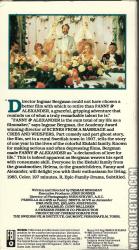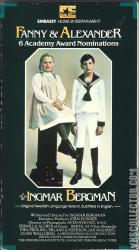Fanny & Alexander
Catalog Number
2171
-
Primary Distributor (If not listed, select "OTHER")
Catalog Number
2171
Primary Distributor (If not listed, select "OTHER")
Release Year
Country
N/A (NTSC)
N/A | N/A | N/A
N/A | N/A
Fanny och Alexander (1983)
Additional Information
Additional Information
Though he made allusions to his own life in all of his films, Fanny and Alexander was the first overtly autobiographical film by Ingmar Bergman. Taking his time throughout (188 minutes to be exact), Bergman recreates several episodes from his youth, using as conduits the fictional Ekdahl family. Alexander, the director's alter ego, is first seen at age 10 at a joyous and informal Christmas gathering of relatives and servants. Fanny is Alexander's sister; both suffer an emotional shakedown when their recently-widowed mother (Ewa Froling) marries a cold and distant minister. Stripped of their creature comforts and relaxed family atmosphere, Fanny and Alexander suddenly find their childhood unendurable. The kids' grandmother (Gunn Wallgren) "kidnaps" Fanny and Alexander for the purpose of showering them with the first kindness and affection that they've had since their father's death. This "purge" of the darker elements of Fanny and Alexander's existence is accomplished at the unintentional (but applaudable) cost of the hated stepfather's life. Ingmar Bergman insisted that Fanny and Alexander, originally a multipart television series pared down to feature-film length, represented his final theatrical film, though within a year after its release he was busy with several additional Swedish TV projects, and his final work, the 2003 Saraband (also produced for Swedish television), eventually received global theatrical distribution. Oscars went to Fanny and Alexander for Best Foreign Film, Best Cinematography (Sven Nykvist), Best Costume Design and Best Art Direction/Set Decoration.
Fanny and Alexander (Swedish: Fanny och Alexander) is a 1982 Swedish drama film written and directed by Ingmar Bergman. It was originally conceived as a four-part TV movie and cut in that version, spanning 312 minutes. A 188-minute version was created later for cinematic release, although this version was in fact the one to be released first. The TV version has since been released as a one-part film; both versions have been shown in theaters throughout the world. The film won four Academy awards in 1984 and was nominated in six categories including Best Director (Ingmar Bergman) and Best foreign language film (won).
Fanny and Alexander has inspired strong admiration and strong criticism.
Rick Moody commented retrospectively that the film[4]
generated a wealth of controversy. Bergman has always seemed to breed conflict among cineastes (Phillip Lopate, for example, has written recently about the polarized reactions to Bergman in the sixties), but Fanny and Alexander, which the director announced as his final theatrical release, seemed to bring the critics out in even greater force, as though there were just the one remaining chance to be quoted on the subject. You either loved the film or hated it, and strong voices from the reviewing community lined up on either side. John Simon, in the National Review: “Few things are sadder than the attempt of a great artist, hitherto fully appreciated only by a minority, to reach the masses.”[4]
The Observer quotes actor Matthew Macfadyen as saying "it featured just the most extraordinary acting I'd ever seen." As a student, the film "was screened to us as an example to follow – an example of people acting with each other. They all knew each other well in real life, the cast, and they rehearsed for a long time and shot it very quickly. The result is extraordinary."[5]
Xan Brooks, in The Guardian's Film Season, chose the film as his "No 8 best arthouse film of all time". He described it as Bergman's "self-styled farewell to cinema", "an opulent family saga, by turns bawdy, stark and strange." Few films, Brooks observes, "boast as many indelible supporting characters". He concludes that "by the time this film pitches towards that astonishing climax (bedsheets burning; magic working) one might even make a case for Fanny and Alexander as Bergman's most mature, clear-sighted and fully realised work."[6]
Vincent Canby in the New York Times begins by noting that the film "it has that quality of enchantment that usually attaches only to the best movies in retrospect, long after you've seen them, when they've been absorbed into the memory to seem sweeter, wiser, more magical than anything ever does in its own time. This immediate resonance is the distinguishing feature of this superb film, which is both quintessential Bergman and unlike anything else he has ever done before." Canby finds it a "big, dark, beautiful, generous family chronicle"; the cast "are uniformly excellent". All of the film "has the quality of something recalled from a distance [,] events remembered either as they were experienced or as they are imagined to have happened. In this fashion Mr. Bergman succeeds in blending fact and fantasy in ways that never deny what we in the audience take to be truth." And, Canby emphasises, Bergman repeatedly refers "to this little world, which in the film refers to the Ekdahls' theater, a place of melodrama, comedy, dreams, magic, and moral order, in contrast to the increasing chaos of life outside."
There are two versions of Fanny and Alexander: a shorter 3-hour (188 minutes) version, and a long 5-hour (312 minutes) version. The shorter version was released first, and the longer version was not released until a year later, even though it had been completed first. The long version was used for a four-part miniseries for television.
The shorter version had its theatrical premiere in Sweden on December 17, 1982. The American premiere for the shorter version was on June 17, 1983. The long version had its theatrical premiere in Sweden on December 17, 1983. The four-part miniseries of the long version later aired on Swedish television.
Release Date: June 17, 1983 @ The Cinema 1 & 3
Distrib: Embassy Pictures
Fanny and Alexander (Swedish: Fanny och Alexander) is a 1982 Swedish drama film written and directed by Ingmar Bergman. It was originally conceived as a four-part TV movie and cut in that version, spanning 312 minutes. A 188-minute version was created later for cinematic release, although this version was in fact the one to be released first. The TV version has since been released as a one-part film; both versions have been shown in theaters throughout the world. The film won four Academy awards in 1984 and was nominated in six categories including Best Director (Ingmar Bergman) and Best foreign language film (won).
Fanny and Alexander has inspired strong admiration and strong criticism.
Rick Moody commented retrospectively that the film[4]
generated a wealth of controversy. Bergman has always seemed to breed conflict among cineastes (Phillip Lopate, for example, has written recently about the polarized reactions to Bergman in the sixties), but Fanny and Alexander, which the director announced as his final theatrical release, seemed to bring the critics out in even greater force, as though there were just the one remaining chance to be quoted on the subject. You either loved the film or hated it, and strong voices from the reviewing community lined up on either side. John Simon, in the National Review: “Few things are sadder than the attempt of a great artist, hitherto fully appreciated only by a minority, to reach the masses.”[4]
The Observer quotes actor Matthew Macfadyen as saying "it featured just the most extraordinary acting I'd ever seen." As a student, the film "was screened to us as an example to follow – an example of people acting with each other. They all knew each other well in real life, the cast, and they rehearsed for a long time and shot it very quickly. The result is extraordinary."[5]
Xan Brooks, in The Guardian's Film Season, chose the film as his "No 8 best arthouse film of all time". He described it as Bergman's "self-styled farewell to cinema", "an opulent family saga, by turns bawdy, stark and strange." Few films, Brooks observes, "boast as many indelible supporting characters". He concludes that "by the time this film pitches towards that astonishing climax (bedsheets burning; magic working) one might even make a case for Fanny and Alexander as Bergman's most mature, clear-sighted and fully realised work."[6]
Vincent Canby in the New York Times begins by noting that the film "it has that quality of enchantment that usually attaches only to the best movies in retrospect, long after you've seen them, when they've been absorbed into the memory to seem sweeter, wiser, more magical than anything ever does in its own time. This immediate resonance is the distinguishing feature of this superb film, which is both quintessential Bergman and unlike anything else he has ever done before." Canby finds it a "big, dark, beautiful, generous family chronicle"; the cast "are uniformly excellent". All of the film "has the quality of something recalled from a distance [,] events remembered either as they were experienced or as they are imagined to have happened. In this fashion Mr. Bergman succeeds in blending fact and fantasy in ways that never deny what we in the audience take to be truth." And, Canby emphasises, Bergman repeatedly refers "to this little world, which in the film refers to the Ekdahls' theater, a place of melodrama, comedy, dreams, magic, and moral order, in contrast to the increasing chaos of life outside."
There are two versions of Fanny and Alexander: a shorter 3-hour (188 minutes) version, and a long 5-hour (312 minutes) version. The shorter version was released first, and the longer version was not released until a year later, even though it had been completed first. The long version was used for a four-part miniseries for television.
The shorter version had its theatrical premiere in Sweden on December 17, 1982. The American premiere for the shorter version was on June 17, 1983. The long version had its theatrical premiere in Sweden on December 17, 1983. The four-part miniseries of the long version later aired on Swedish television.
Release Date: June 17, 1983 @ The Cinema 1 & 3
Distrib: Embassy Pictures
Related Links






Comments0
Login / Register to post comments